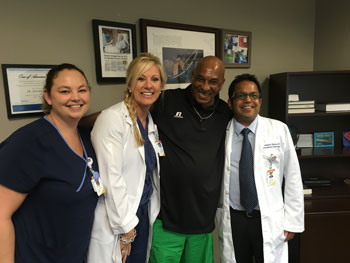Ronnie Jones, a TPA Miracle
Aug 24, 2016 Wednesday, July 13, 2016 started like any other day for Ronnie Jones. He woke up, ran errands, and paid bills. It was an off day for him – he normally works at the Harbert Center in downtown Birmingham, Alabama as a janitor. Once he returned home, he started to cook a meal for himself, and that’s when he noticed that his right side was becoming weaker.
Wednesday, July 13, 2016 started like any other day for Ronnie Jones. He woke up, ran errands, and paid bills. It was an off day for him – he normally works at the Harbert Center in downtown Birmingham, Alabama as a janitor. Once he returned home, he started to cook a meal for himself, and that’s when he noticed that his right side was becoming weaker.
“I noticed that my right side wasn’t working well – I couldn’t hold my skillet,” Jones remembers. This was especially concerning to him, as Jones had his left arm amputated due to a work accident. When he noticed this, he did something that probably meant the difference between life and death. “I turned off the stove, and went to sit down, thinking that it was going to pass. But then it got worse and I couldn’t move my legs, and I felt the right side of my face start to droop. I realized I was having a stroke.”
When Jones tried to stand, he fell, but he managed to crawl and unlocked his front and back doors. He tried to call 9-1-1, but was unable to due to lack of mobility in his right arm. That’s when he started yelling for help. Luckily, a neighbor was dropping by on a whim to visit, and was able to enter the house and call for help. She immediately called 9-1-1.
Less than an hour after he first started noticing symptoms, Jones was in the Emergency Room at Brookwood Baptist Medical Center.
“When he arrived to our ED, he was unable to move his right side at all,” recalls Cammie Shoemaker, RN, CNRN, and Director of Neuroscience Unit and Stroke Program at Brookwood Baptist Medical Center. “Luckily, EMS was able to activacte the Code Stroke Alert Protocol while in the field, so we were ready for him.”
“I was just crying when I came in. I couldn’t move anything. I don’t have a left arm, and my right arm couldn’t move. I was terrified,” Jones said.
“When I saw him, I couldn’t help but be emotional,” Shoemaker said. “It was heartbreaking seeing him like that. I just hugged him and told him ‘Everything will be alright. We’ll get you through this.’”
Due to the advanced notice that EMS gave the hospital, Shoemaker met Jones when he arrived and was able to start treatment immediately. Jones was quickly taken to have a computed tomography scan, or CT scan, to check and see if he had bleeding in his brain. Once it was determined that he did not, he was given a lifesaving medicine called Tissue Plasminogen Activator, or TPA. Within minutes, Jones was moving his right side again. He was able to go home, without any residual effects from his stroke, 3 days later.
“The biggest thing with stroke is the time frame,” says Jitendra Sharma, MD, Medical Director of the Acute Stroke Program at Brookwood Baptist Medical Center. “It is a miracle that he recognized the symptoms and was able to get to us in the window that we have to give TPA.”
While it is a lifesaving drug, TPA can only be given within three hours of onset of stroke, and only by certified facilities. That is why knowing the signs of a stroke are so important.
“Many people do not realize they are having a stroke. They think that the symptoms will go away and try to sleep it off, and then it’s too late,” says Dr. Sharma.
To remember the symptoms of a stroke, remember to act FAST:
- Face: one side of the face droops
- Arms: One arm drifts downwards when both are raised
- Speech: slurred or strange speech
- Time: if you observe any signs of stroke, call 9-1-1 immediately
“We can save lives when they get to us in time, so knowing the symptoms are important. We have too many patients who, because they are outside of the three hour time window, have limited treatment options,” says Dr. Sharma.
“Because Mr. Jones got to us within that three hour window, we were able to totally reverse the effects of his stroke. This means that he can still live on his own, work, and continue his life. If he had come to us later, there is a high possibility that he would have had to move to a full-time care facility.”
For someone like Ronnie Jones, who is known by family, friends, and neighbors as someone who would do anything to help anyone in need, it would have been devastating.
“I am so thankful for these doctors who saved my life. It was a miracle that I was saved,” Jones said. “They gave me my life back. Without them, who knows where I’d be today.”
“And even though it hasn’t been long since I had the stroke, you can’t tell. Even the people at physical therapy can’t tell I had a stroke. It truly is a miracle.”
Now, as a way to help save more lives, Jones is determined to teach others about his ordeal and the importance of making it to the hospital in time if the symptoms of a stroke appear.
“I’m telling everyone – my church, my neighbors, anyone who will listen. Now that I know what it means, and how important it is, I want everyone to know.”
